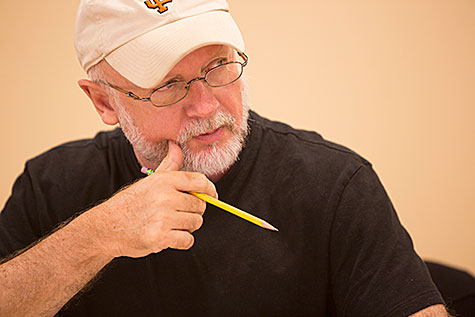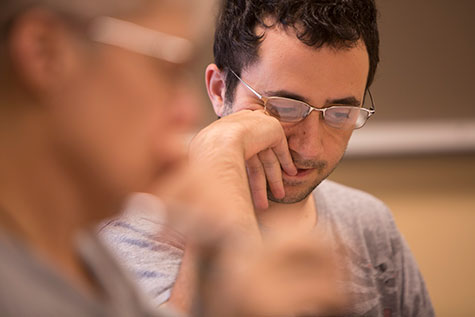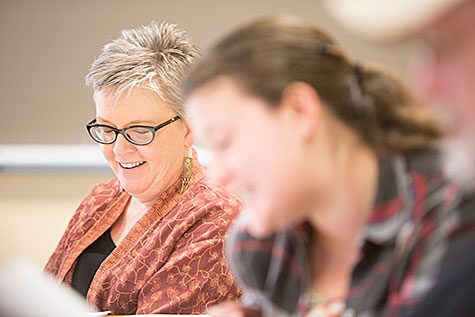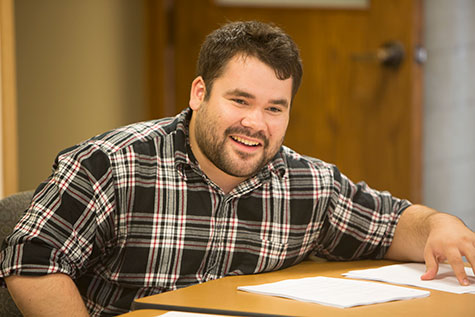
With the success of Carolyn Kras, Liz Calvert, Dan Rubin, Brian Golden, Marissa Wegrzyn and other recent alumni, the Performing Arts Department (PAD) in Arts & Sciences at Washington University in St. Louis has emerged as a national incubator for playwriting talent. Indeed, young alumni have launched Theatre Seven of Chicago and Theatre Confetti in Philadelphia, both of which specialize in new play development.
Much of the credit goes to Carter W. Lewis, the PAD’s playwright-in-residence. A two-time nominee for the American Theatre Critics Award, Lewis is author of more than 20 full-length plays and has received over 150 productions from companies around the nation.
This week, Lewis and visiting dramaturg Marge Betley will lead the PAD’s annual A.E. Hotchner New Play Festival. Named for alumnus A.E. Hotchner (who famously bested Tennessee Williams in a campus playwriting competition), the festival will feature staged readings of three promising new works.
We sat down with Lewis to discuss the Hotchner Festival, new play development and the difficulties of letting go.
What’s the difference between writing drama and writing prose?
In some ways, that’s the biggest hurdle. It’s the difference between dialogue and narrative. Sometimes writers have great tools, great verbal acumen, but they fail at playwriting because they want to shape the story with descriptive narrative. They want someone to speak their beautiful language out loud. But that’s not a play.
So what is a play?
A play is based in behavior — it’s not just spoken prose. I always ask students, is a play more like a book or a symphony? And the answer is, it’s more like a symphony. Because even though it might take the form of a book, a play is really a blueprint that other artists bring to fruition. It’s a collaborative artform.

As a writer, is there a moment when you know that something will actually work on stage?
Yeah, there is, but it’s different for each play. Sometimes it’s very fast and clean — you know the journey of the characters and the play just writes itself. I finished Evie’s Waltz in three weeks. And sometimes you get stuck and everything feels like a mess.
How do you explain the difference?
I don’t know! Sometimes the magic is there and sometimes it’s not. [Laughs.] I have a big file of things I’ve thrown away.
But you go back to the toolbox. What drives a play? It’s the wants and desires of the main characters. If they don’t want something specific enough, and they don’t want it badly enough, the play doesn’t have a motor.
You might start out with an idea: poverty, say, or the destruction of the middle class. But if you don’t embed it in your characters, if you don’t give them a strong or specific-enough want, then the play just muddles along. You have a concept but no place to go.
What’s your own process like? How do you begin a new play?
When I start a play, I’m always in great danger because I don’t have a well-defined arc or journey in mind. I start with a couple of characters in a situation. I don’t know where I’m going, I don’t know where they’ve been, but I try to work it out on paper.
People think writers all have book-lined walls and children who’ve read Catcher in the Rye by age 4. But I know a lot of writers, and most of them hate what they write each day. They’re tortured, they’re frustrated, they think it’s never going to be produced. So if a student is struggling, if it feels difficult — that doesn’t mean you can’t do it. It just means that you’re a writer.

Let’s talk about the Hotchner Festival. How does it work?
Well, the deadline for submissions is always some time in January. I then distill a group of 8-12 plays and send them to an adjudication committee, which selects three for development. In the spring, I do some dramaturgical work with the playwrights — what’s working, what’s not — and they do rewrites over the summer. In the fall, we send new drafts to our visiting dramaturg and start working with the directors and talking about casting.
And then we start rehearsals. We sit around the table, read it out loud and talk about it. But it’s a playwright-driven process. The playwright decides what we do day-to-day based on what the play needs at this point in its development. We might work on one scene, or do a complete run-through. The playwright can continue revising and editing right up until the public reading.
Describe that first reading around the table. What does a playwright learn from hearing the words spoken?
It’s terribly frightening. I remember one former student banging his head on the table. “Why don’t my characters just shut up?” But it also can be exhilarating. I’ve been doing this long enough that I know, in the early stages, it’s supposed to be less than perfect, or even downright awful. As playwrights, we start by making messes, and then we go about cleaning them up.
In the beginning especially, that must feel very daunting — like the whole show lives or dies by your words alone.
I think that’s right. But once you see it on stage, you realize that it’s not only about you. It’s also about the work of all your collaborators — all the people who have generously given of their time, effort and talent.
The typical metaphor is giving birth to children. You raise them for five or six years, but then you have to start giving them away — to daycare or babysitters, to educational institutions, to spouses and the larger community.
In a production, the playwright begins as Lord God. But by halfway through you’re just a sidekick, and by the time it finally opens you’re getting everyone else coffee.

The A.E. Hotchner New Play Festival begins at 7 p.m. Friday, Sept. 27, with a staged reading of “Laud’s Trade” by Alice Hintermann, a senior anthropology major in Arts & Sciences. The festival continues at 2 p.m. Saturday, Sept. 28, with “The Impossible Adventures of Supernova Jones” by 2013 alumnus Aaron Senser, and concludes at 7 p.m. that evening with “The End” by Naomi Rawitz, a sophomore majoring in psychology and women, gender snd sexuality studies, both in Arts & Sciences.
All readings are free and open to the public and take place in The A.E. Hotchner Studio Theatre, located in Mallinckrodt Center, 6445 Forsyth Blvd.
For more information, call (314) 935-5858, visit pad.artsci.wustl.edu or follow us on Facebook.